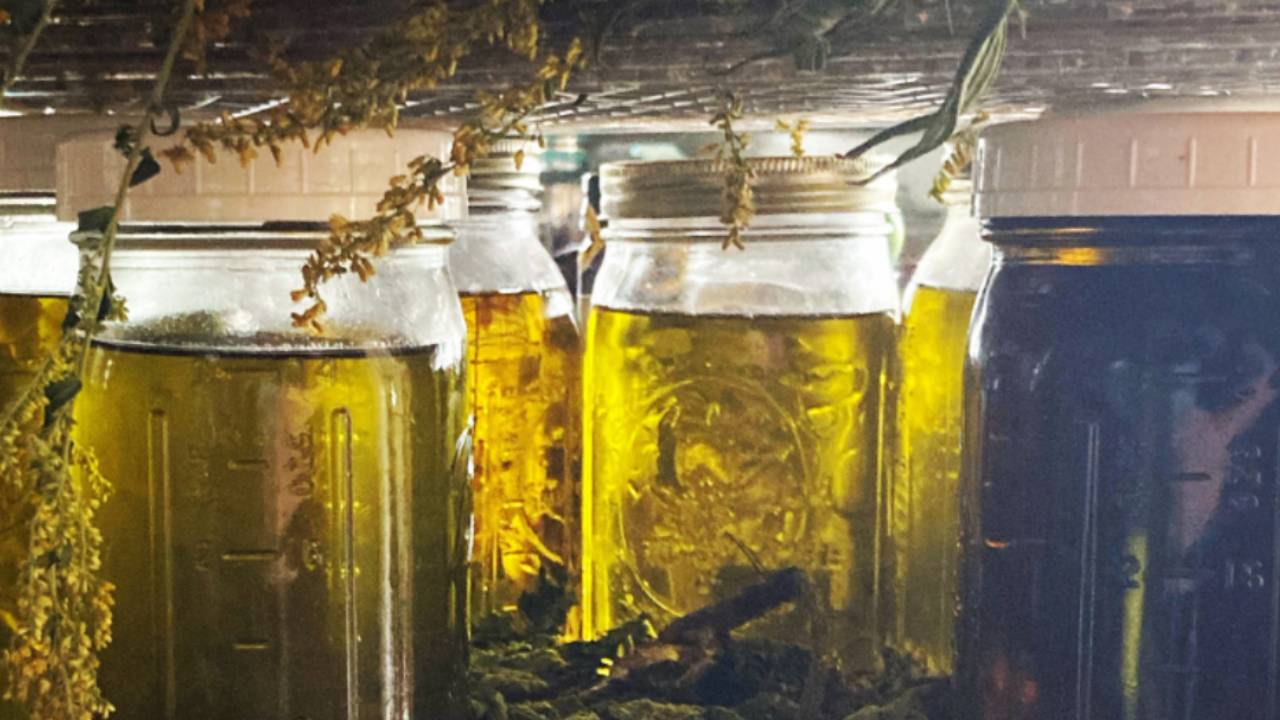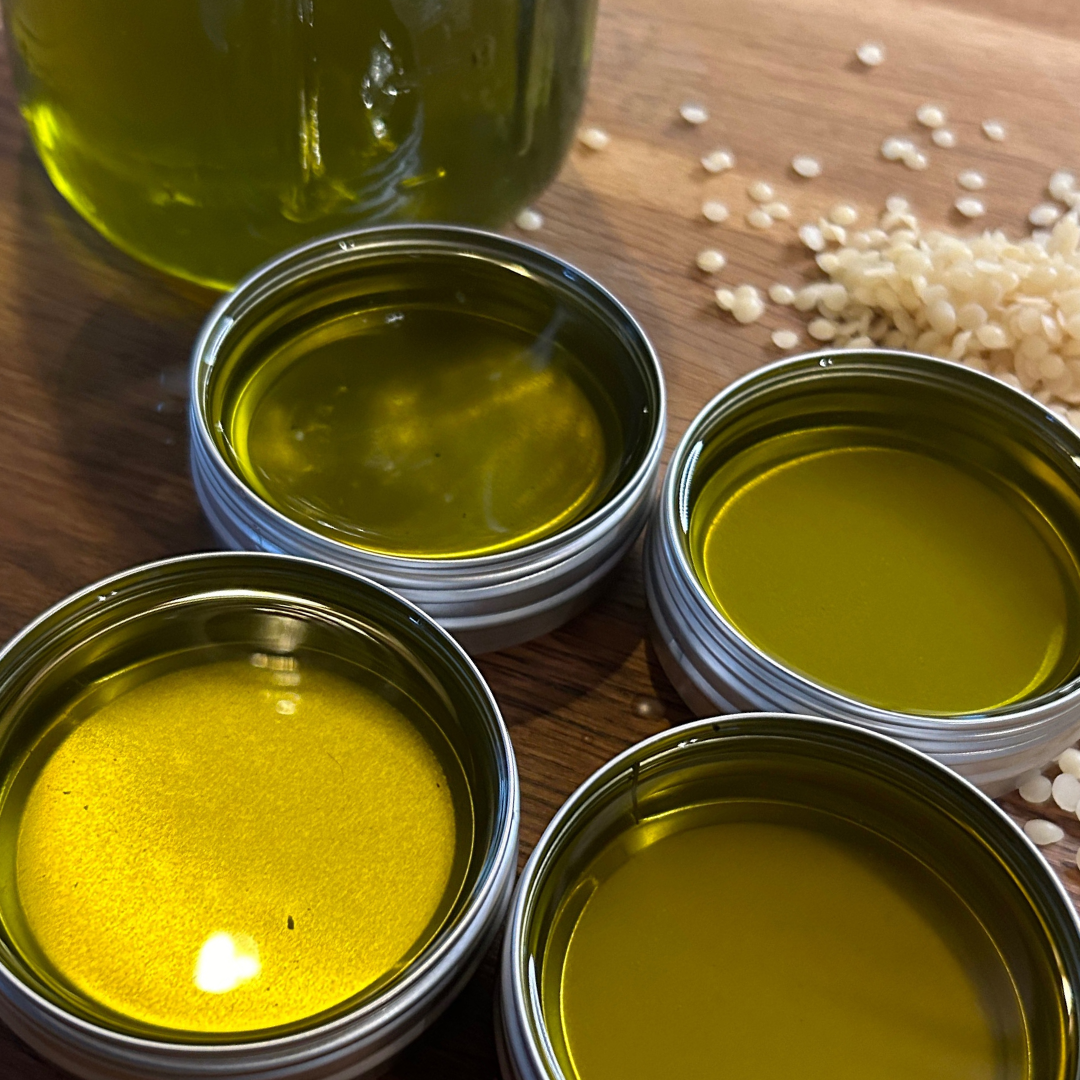
DIY Herb-Infused Oils: How To Make Herbal Oil
herbal skin careHerb-infused oils are the heart of almost every single topical herbal product you can make. Salves, lotions, creams, lip balms, body scrubs, and soaps, all use herbal oils as their base. You can even use them directly on your skin for a concentrated powerful remedy.
They are gentle to be used for all skin types daily and are powerful enough to be used in more acute situations like rashes and poison ivy. Made with the right oil, they can even be infused for culinary purposes, and they sure are delicious. Have you ever tried a sage and garlic-infused avocado oil on pork chops? Insert drool here!
Benefits of Herb-Infused Oils
Herb-infused oils offer endless benefits for skin, health, and even culinary creations. Some good examples include:
- Skin Care: Herb-infused oils address dry skin, rashes, and skin problems like eczema or minor burns. Calendula-infused oil (Calendula officinalis), for instance, is excellent for soothing irritation and promoting healing.
- Topical Use: Many oils, such as St. John’s Wort (Hypericum perforatum) or lavender, are applied directly to calm inflammation, support massage oils, or heal external use concerns.
- Culinary Use: Some herbal oils like rosemary-infused oil or garlic-infused oil are delicious additions to salad dressings and marinades. Stick to culinary herbs when you’re getting started with this. Herbs like oregano, sage, cilantro, basil, etc.
- Natural Remedies: As we said earlier, herb-infused oils are the base for lip balm, salves, soaps, lotions, and creams. They are a great way to create products that heal while nourishing the skin naturally.
Best Oils for Herb Infusions
Choosing a carrier oil that complements your goals and herbal properties is the first step in making a good-quality oil. Popular options include:
- Olive Oil or Extra Virgin Olive Oil: Great for dry skin, herbal remedies, and culinary uses. The drawback is that this oil has the shortest shelf life. But, stored correctly, it can still last up to a year.
- Coconut Oil: Excellent for skin care, calendula oil, and herbal salves. Using a coconut oil that has a higher melting point makes storage and portability easier. Nobody wants to through a salve in their purse on a summer day and have it melt all over the place.
- Sweet Almond Oil: A light oil perfect for massage oils and skin care products. This one is for external use only.
- Grapeseed Oil: A neutral oil with a high-quality finish.
- Sunflower Oil: Affordable and versatile for large batches of herbal-infused oils.
Ways To Infuse Oils
Infused herbal oils are created by steeping dried herbs in an oil medium. It’s important to use dry herbs when infusing them into oil. Fresh cut herbs have water content while dried herbs do not. When you infuse water into oil, it significantly reduces the shelf life of the oil. Since spoilage happens so much faster using fresh herbs, if you choose this method, be sure to store your finished infusion in the refrigerator and use it within a few months.
Herbal oils are a wonderful way to incorporate herbs into your daily life, but they require a bit of preparation to be ready for use. There are two different methods available to infuse the properties of herbs into an oil medium. The slow infusion method (the long way) and the quick heat method (the fast way). While the slow infusion is the preferred method for its potency and quality, the quick method can be a good option when you need an oil fast.
The Preferred Long Method: 4-6 Week Herb Oil Infusion
This simple method uses time, rather than heat, to extract the medicinal properties of your dried herbs. It is the most effective way to create high-quality oils with an extended shelf life. This is the preferred method because herbs don’t love heat in most cases. The long method simply required a room temperature shelf, darkness, and time.
What You’ll Need:
- Dried herbs
- Carrier oil of your choice
- A clean glass jar with a tight-fitting lid
- Fine mesh strainer, fine cheesecloth, or herb press (this is my favorite affordable press)
- A dark place to store the infusion
Step-by-Step Instructions:
-
Prepare Your Herbs
- Always use dry herbs. Fresh herbs have water content that can lead to bacterial growth. If using fresh flowers, wilt them overnight to reduce moisture.
-
Fill the Jar
- Place your herb material into a clean glass jar. Cover the herbs completely with your carrier oil, leaving about an inch of space at the top.
-
Infuse in a Cool, Dark Place
- Seal the jar tightly and store it in a cool, dark place for 4-6 weeks. Shake the jar gently every day to help the herbal properties infuse evenly.
-
Strain the Oil
- After 4-6 weeks (some herbs may need less time), strain the oil through a fine mesh strainer or cheesecloth into a clean bowl. Discard the dry plant material.
-
Store Properly
- Pour the strained oil into airtight containers like glass jars. Label with the herb name and date. Store in a dark place to preserve its shelf life.
The Quick Heat Method: Fast Herb Oil Infusion
The quick way uses gentle heat to extract herbal properties in 4-6 hours. While it’s not as potent as the long method, it’s ideal for last-minute needs. When you use this method, it’s very important to keep your heat very low. Too much heat will break down the properties of the herbs. Without good herbal properties, all you have is a cooked carrier oil.
What You’ll Need:
- 1 cup dried herbs
- 1-1.5 cups carrier oil
- Double boiler, slow cooker, or a heat-safe glass bowl over a low water level in a pot
- Fine mesh strainer, fine cheesecloth, or herb press (this is my favorite affordable press)
- Airtight storage jar
Step-by-Step Instructions:
-
Combine Herbs and Oil
- Place the dried herbs and carrier oil into the top section of a double boiler.
- If you are using a slow cooker, place the mixture into a mason jar. Place the jar in the slow cooker with a few inches of water in the crock.
-
Gently Heat the Oil
- Heat the oil at the lowest temperature for 4-6 hours. Stir (or shake) occasionally to ensure an even infusion. Do not overheat, patience is important here. Remember, high heat can destroy the beneficial active compounds. Slow and steady wins the race.
-
Strain and Store
- Strain the oil through a fine mesh strainer, cheesecloth, or herb press, and transfer it into a clean, labeled jar. Store in a cool place for later use.
Important Things To Consider
- Avoid Direct Sunlight: Whether using the long method or quick method, sunlight degrades the oil. Keep it in a dark place, out of direct sunlight.
- Watch for Water Content: Never use wet herbs—bacterial growth will ruin your oil. (See St. John’s Wort in the next section for an exception)
- Small Batch, High Quality: Make small quantities to test new combinations of herbal oils.
- Extend Shelf Life: Be sure to research your herbs to ensure you are using the best oil for your infusion. The right combination has a longer shelf life and can last up to 2 years with proper preparation and storage.
Great Herb Options for Infusions
- Calendula Flowers (Calendula officinalis): Soothes skin irritations and promotes healing.
- Lavender (Lavendula angustifolia): Calming, anti-inflammatory properties, and great for massage oils, and for mild burns.
- St. John’s Wort (Hypericum perforatum): Relieves muscle pain and nerve discomfort. This is one of the few herbs that should be infused into oil while it is fresh. Fresh St. John’s Wort contains active compounds that give deep relief to muscle and nerve pain.
- Sage (Salvia officinalis): Makes a good addition to a salve for respiratory and sinus congestion, and makes a delicious culinary herbal oil.
- Rosemary (Salvia rosmarinus): Stimulates circulation and adds a herb flavor for culinary use.
Making your own herb-infused oils is a simple yet rewarding process. Infusing herbs gives you control over the quality and freshness, so you can the oils to meet your specific needs. Whether you choose the slow infusion method for maximum potency or the quick method for last-minute needs, you’ll have a versatile base for herbal remedies, skin care, and even culinary use.
Don't miss a thing!
New herbal education and recipes delivered to your inbox.
We hate SPAM. We will never sell your information, for any reason.
Recent Posts


